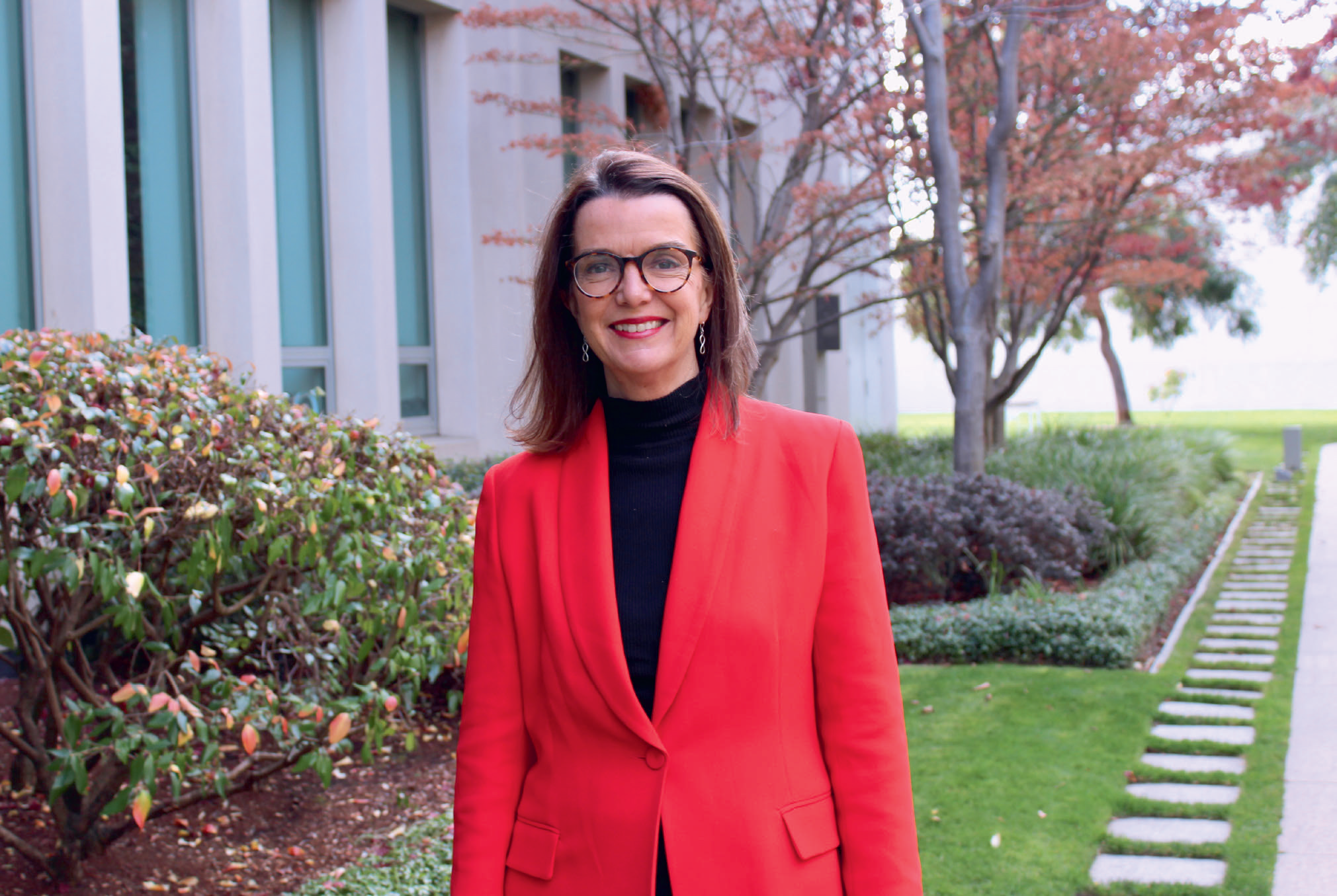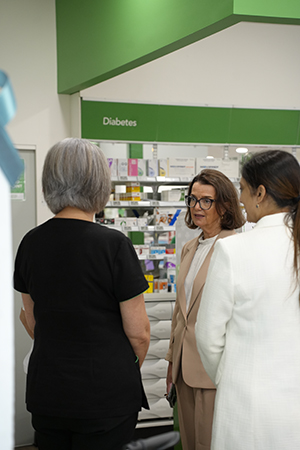A strong voice on health policy, Senator Ruston has called for greater use of community pharmacies to ease cost and access pressures. She highlights the benefits of point-of-care testing in regional areas, backs reduced PBS co-payments, and is pushing for the release of the Scope of Practice Review so pharmacists can play a bigger role in primary care.
Our first question is always about your local community pharmacist – who is yours when you’re at home in Renmark?
The Priceline Pharmacy in Renmark is my local and it’s currently owned by my old mate, Sam Scaffidi. It’s changed name a few times, but I would be giving away my age if I admit that I can remember when it was John’s Chemist and the pharmacist was Clacker John. I can remember many a Saturday afternoon dropping by John’s Chemist to get advice or an ice pack after a hockey injury.
You’ve been involved in politics in one shape or another since the late 1980s – what areas of Australia’s healthcare landscape do you believe have seen the biggest advancements?
There have obviously been some significant and astounding advancements when it comes to innovation and technologies in Australia’s healthcare system – the first titanium heart certainly comes to mind as a standout. From a populationwide perspective, one of the most important advancements in recent times has been point-of-care testing. It is so important for preventative health outcomes and early intervention. But most particularly, it’s an important health equity piece.
I’ve been really impressed to see innovative point-of-care testing models being used in a growing number of community pharmacies across the country.
Senator the Hon Anne Ruston
As a girl from the regions, I see the benefit for Australians living in rural, regional and remote areas who would otherwise have to travel many, many miles to access the testing and care they need. I’ve been really impressed to see innovative point-of-care testing models being used in a growing number of community pharmacies across the country.
Senator Ruston says she remembers dropping in to her local pharmacy when she was a younger person on many a Saturday afternoon to get advice or an ice pack after a hockey injury
You were appointed Deputy Leader of the Opposition in the Senate on January 24, 2025 – what are the top three things, personally or professionally, that have changed for you since then?
Coming into this new parliamentary term and taking on a more senior role in the Opposition, I’ve been particularly focused on how I can help mentor the next generation, especially the incredible female candidates and new MPs we have in our ranks. I also remain focused, as I always have, on using my position to cast a regional lens over policy, because I believe it is so important that we hear the voices of regional Australians in Canberra.
Too often, we see such a city-centric approach from government, and we know that health outcomes are worse the further we get from a capital city. I’ve also had the privilege of adding disability and the NDIS to my portfolio responsibilities, which is a really important opportunity to look at all three of our care sectors and how we can address the challenges with a more holistic approach. I believe they have been siloed for too long, despite how interconnected they should be when it comes to the workforce in particular.
As Shadow Minister for Health and Aged Care, and given your concerns around the rising out-of-pocket costs of going to see a GP in Australia, what more would you like to see happen regarding full scope of practice for community pharmacists in Australia?
I have significant concerns about the growing out-of pocket costs in our primary healthcare system right now. The data tells us that it has never been harder or more expensive for Australians to see a doctor.
In the midst of this crisis, we do not have the luxury of underutilising the resources we have available in our health system. That is why I am really keen to see the Government’s response to their Scope of Practice Review, which they have so far failed to release. I do not want to see this review continue to collect dust on the Health Minister’s desk.
What feedback have community pharmacists and members of the public shared with you regarding the recent bipartisan-supported reduction in the PBS co-payment?
The feedback I’ve received is that it has never been more important to ensure Australians have affordable access to the medicines they need. We know that more and more Australians are avoiding accessing essential healthcare right now because they just cannot afford it. In fact, 8 percent of Australians avoided or delayed refilling their scripts last year due to cost concerns. This is unacceptable in a country like ours. We took the lead on committing to reduce the PBS co-payment at the 2022 election, and we were happy to commit to its further reduction in recognition of the rising healthcare costs facing Australian families.
The Pharmacy Guild of Australia is set to commission a white and green paper to explore the ethics of AI in community pharmacy – what do you see as the potential for using AI in our health sector?
I believe opportunities for innovation in our health sector are always important, especially if they can add efficiency into the system, reduce the administration burden facing our health professionals and free up our available resources - especially at a time when we are facing workforce shortages and increased wait times for care. But of course, we must ensure that the appropriate safeguards are in place to keep up with these significant advancements in technology.
What keeps you up at night in relation to your position as Shadow Minister for Health and Aged Care?
Something I really struggle with is the idea of bureaucracy preventing Australians from getting access to the care they need and deserve. We are seeing this right now with the home care wait list, which has skyrocketed to 87,000 older Australians because the Government has failed to add new packages into the system. I find it unacceptable that older Australians are having to wait as long as 16 months to get access to the care they have been assessed as needing, simply because of bureaucratic processes and government-initiated delays.
I have significant concerns about the growing out-of-pocket costs in our primary healthcare system right now. The data tells us that it has never been harder or more expensive for Australians to see a doctor.
Senator the Hon Anne Ruston
As a public figure, and considering your portfolio, do you feel responsible for modelling good health and wellbeing for all people in Australia – and can you tell us your three top tips for good health?
I feel strongly about the need to focus on preventative health by encouraging Australians to live active and healthy lifestyles. Not only is it important for people’s physical health, but it is critical for their mental wellbeing as well.
So, my top three tips would be: find the time each day to be active, even if it’s just a walk; focus on eating whole foods; and get outdoors to spend some time in the sunshine or amongst nature. We should not underestimate the importance of daily movement, avoiding processed foods and time spent outdoors for our general health and wellbeing.
In addition to your political positions, you’ve also been a commercial rose-grower and chief executive of the National Wine Centre – what would you be doing now if you weren’t representing South Australia?
I’m someone who truly believes in those sliding door moments and grasping the opportunities that come my way with both hands, so it is hard to say what I would be doing now, but I can say for certain that I would be keeping myself busy. My interests have always been tethered to regional South Australia, whether that be working as a grower in the Riverland, representing our wine industry, or working on public policy to support regional healthcare, so I believe that would not have changed regardless of the opportunities that came next.
What are you most proud of from your time in politics?
I am proud of the contributions I have been able to make to public policy that have had a real impact on the lives of Australians, whether that be supporting Australians through COVID with JobSeeker, launching and implementing Australia’s Disability Strategy 2021-2031, or introducing the Escaping Violence Payment to support women who have made the brave decision to leave a violent relationship. Looking forward, a lasting legacy I would be proud to achieve is contributing to a healthier Australia.











